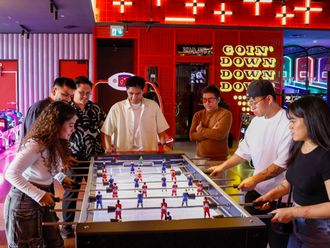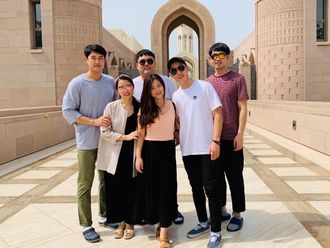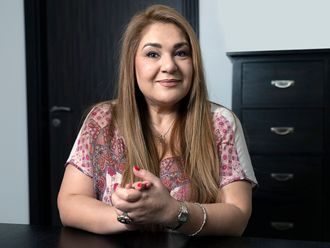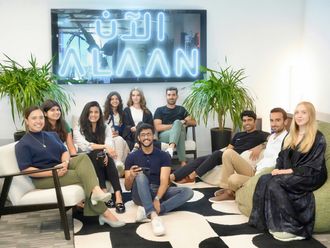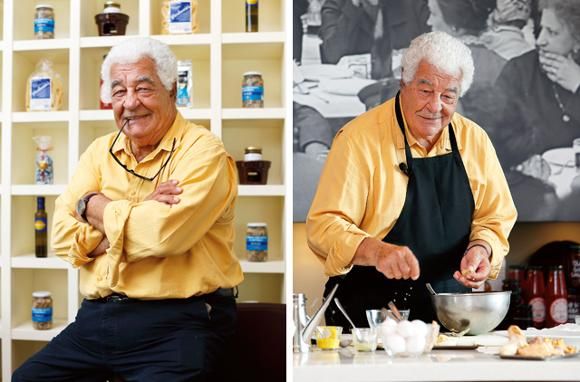
Antonio Carluccio is late for the interview. But when the 75-year-old elder statesman of Italian cuisine bustles into his namesake restaurant at The Dubai Mall, he is all concern and charm, apologising profusely for his slight tardiness. “The truth is, I overslept,’’ he says. That was a sign of things to come in the interview: refreshing honesty. He has a round crinkled face, a warm smile, bushy eyebrows and curly white hair, that he reportedly insists on trimming himself.
Antonio’s full of avuncular concern, whether it’s for the serving staff or senior management. When he speaks to someone, he goes into a huddle with them, giving them his undivided attention and his infamous charm – a huge reason for his enormous success. Antonio’s philosophy is to keep it simple and be honest – in food and in life. “Honesty in food is one of the most sought-after philosophies,” he says. “My philosophy on food reflects my philosophy on life: To use the best ingredients with minimum fuss for maximum flavour.
If you’ve got the basics right, there is no need for fusion, artifice or glamorising food. Perfection already exists in nature. There is no need to mess with it unnecessarily.’’ Despite being a septuagenarian, he keeps up with the times. “Today’s technology is quite inspiring,” he says. He’s even introduced an Antonio Carluccio iPad app. Speaking admiringly of new technology, he says, “Blogs are lovely, especially if you are looking for inspiration.”
When it comes to ingredients, he has a few favourites – mushrooms and truffles. “I’ve even got a dog named Truffle!” he says. And his favourite meal? “A delightful plate of spaghetti with tomato sauce and basil.” Simple, but wonderful – like the food he cooks. He tells Friday more about his work, his family and why youngsters should consider being entrepreneurs.
Work
Work is very important to me. I am 75 now and I could retire, but I like to work because I love what I am doing. I don’t find it difficult. I just balance it with rest, and that keeps me going. I was born and grew up in Italy. When I was young, I never guessed I would be in the world of food. Initially, I worked as a crane operator, a commercial painter – I’ve painted the inside of huge gas turbines – and a salesman selling hair oil made by a friend of mine in villages in Italy.
However, one thing that has been a constant in my life is perfection. It’s something I learnt from my father, a railway stationmaster who did his job perfectly. He was adamant about never cutting corners. The result is satisfaction and a rewarding career. The principle is the same for success in any job; do it well. Believe me, some day somebody will recognise it. My early attempts at employment did not point to a career in cooking. I left school at 16 and I felt I wasn’t cut out for university.
I also wanted to see the world, so I decided to join the navy. I went to naval school for a couple of years, but by the time I was ready to graduate I felt had enough of the regimental life. If I had stayed I would have to spend the next seven years sailing, which I discovered I didn’t like. I then worked for some years at Olivetti, the typewriter manufacturer, in sales. But that was not my interest either.
It was at this point that I lost my 13-year-old brother Enrico, ten years my junior, in a tragic drowning accident. I was devastated and wanting to escape from it all so I left for Vienna, Austria to study languages. It was there that I started cooking for myself and my roommates. That’s when I really learnt where my passion lay. In fact, I soon realised that my cooking was getting me a lot of friends. And I’ve continued for so many decades now.
So you can say I first started cooking out of necessity and then out of curiosity. As I went deeper into it, I saw that Italian food could be fantastic to showcase to the world. In time, I came to be known as the deacon of Italian cuisine and someone who knows a little bit more about the cultural aspect of it, too. I started investigating the food ethos in Italy, the food for the poor as well as the rich, and it was all very interesting.
From Vienna I moved to Germany, following my girlfriend, where I spent 13 years dealing Italian beverages before moving to London in the late Eighties. In London, I used to cook up a storm. That led me to my career as a restaurateur. It was my talent at cooking that helped me meet my ex-wife Priscilla and this led to my first job managing a restaurant, the Neal Street restaurant, which was owned by my brother-in-law Sir Terence Conran. Jamie Oliver was an apprentice under me at Neal.
We then expanded and started our first delicatessen in 1991. This led to eventually starting our Carluccio’s café in 1999. We sold it some years later, but I never gave up working. Today I work as consultant not only for the Carluccio’s brand, but for many other chains around the world. I am constantly flying – one day to India, the next to China... It keeps me young and happy.
Play
I grew up mostly in Piedmont. During the Second World War – I was two when it started and eight when it ended – the family could only afford to eat meat on Sundays. For the rest of the week we ate vegetables supplemented by edibles that my siblings and I would search for in the forest. We were taught to recognise wild rocket, edible berries and mushrooms. Life was hard and, at times, cruel. We had a nomadic life, moving wherever my father was posted in Italy.
This led to my mother becoming an expert in cooking all the specialities of Italian cuisine – and not just from the region she was brought up in. Italy is very complex. There are 20 regions, each with its own food, dialect and culture. Some of my earliest memories are of my mother cooking pasta for lunch. We stayed near the railway station and I would be told to run down and see if the train was running on time. When I saw the train I would rush back, and she would put the pasta on the fire.
It would take my father exactly five minutes to come home for lunch and the pasta would be ready, perfectly al dente (firm, not hard). That is how I learnt about cooking... I learnt, for instance, that pasta must be eaten straight away and not left to stand. I learnt while watching what my mother was cooking. I wasn’t told anything directly, but learnt by looking, sniffing in the pan and trying to help my mum with the shopping. The secret to my enduring happiness is that I keep busy.
When I was a child I was interested in all kinds of sports, especially athletics. I used to go to school more for participating in sports than to study, and at one point I fancied myself a sportsman. While I was growing up, I took up – as well as abandoned – a lot of interests. I never saw anything as too low or too demeaning for me. The childhood activity of foraging for wild herbs and mushrooms slowly turned into a passion that has endured to date. When I was a child, my father and a friend used to take me along when they went truffle and mushroom picking.
Now I know how to identify about 200 edible varieties of mushrooms. I’ve written two books on them. Once I left Italy I thought my mushroom hunting days were over. But when I moved to the UK, I rediscovered a wealth of wild mushrooms. Today this is more than a hobby for me. I also discovered the world of books, purveying my knowledge of food on to pages.
I also learnt the new medium of television and video, again through my various programmes on Italian food. Being involved in the creation of all these things are ways of relaxing as well. It keeps me from retiring, which I have always equated with death. Another pet passion I have is carving and whittling walking sticks out of branches I pick up on my walks. It’s a great hobby.
Dream
I can’t say that cooking was my dream, though today I can’t think of anything else I’d rather do. Sure, I wanted to be rich and famous, travel the world and do what all kids dream of, but cooking just happened. Cooking can be an incentive for living. I receive a lot of letters from retired men and widowers, wanting to know if they can improve the quality of their life through cooking. I say they can! It doesn’t matter if you are rich or poor.
Even baked beans fried in a little oil with some salt, garlic and chilli can transform an ordinary meal into something special, and can provide you with a sense of purpose, achievement. These days I tell youngsters that they should be entrepreneurs. When you become redundant in a job, you have to start looking for something that interests you.
If you don’t get the job you like, it could be a problem. But if you are an entrepreneur, you can do just the kind of job you love. In Italy, for example, people adapt themselves to any kind of situation. I’ve seen men selling stuff on the roads between jobs and some even find a new destination in life. My other piece of advice is to keep learning all your life. My dream now is to continue cooking and working until the very end.




